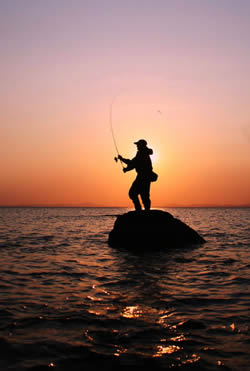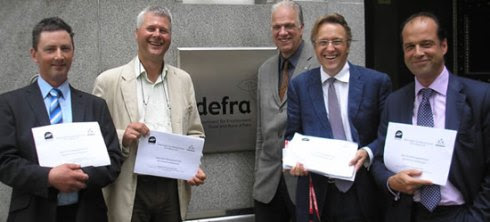On Monday 26th January the EU made its ground breaking announcement, imposing emergency measures on pair trawling for bass. There have since been further indications at EU and UK levels to support previous statements that this (temporary) measure is just the first move. Further (as yet unclear) measures it seems will follow to reduce the take on our bass to a sustainable level.
This week’s announcement left so many of us fired up by the fact we can make a difference. We are now hovering over our keyboards, just waiting for a signal, to respond to the next round of measures. It is obvious we need to know what we need to campaign for, and towards who we should direct our words, to ensure the full 80% reduction in bass landings demanded by ICES in 2014 is implemented. So with this in mind I have sought to summarise where we are now, what the view of BASS is as to recent events, and what we can now do.

There is much to show ongoing action is taking place in the corridors of power and the situation is changing by the day. At an EU level it seems meetings to determine what further measures will take place are taking place in back rooms to which we seem to have no access and no direct input to. On the surface this seems somewhat antidemocratic. Yet these meeting are the results of politicians deeming that change is needed and rather than those that shout the loudest influencing the argument (as has occurred for years in fisheries decisions), it’s now a case of letting those best qualified to determine how to do this decide what is needed without undue political influence – in the same way that the setting of UK interest rates has been taken out of the hands of politicians and is now determined by a panel of independent experts if you like.
Indications that the politicians recognise that change in bass management is needed continue to be clear. On Thursday an EU staff working document was released titled “Emergency Measures on Sea Bass” was published. http://www.parlament.gv.at/PAKT/EU/XXV/EU/05/42/EU_54245/imfname_10526733.pdf This not only indicated the current situation is unsustainable and in need of big changes but also acknowledged the value of recreational angling, as this extract from the document shows:
(17) Recreational fishing represents an important economic activity.
– In France, more than 1.3 million people undertake more than 9 million fishing trips per year, and sea bass is the main species caught.
The total yearly expenditure on angling equipment, baits and boats is estimated at approx. EUR 530m.
– In the UK, it is estimated that in 2012, almost 900,000 sea anglers spent GBP 1.23bn on the sport.
– By comparison, the annual revenue generated by the first sale of sea bass for commercial fishing in France amounts to EUR 43 million (according to France)
While a direct comparison of those figures is not entirely possible, they show nonetheless that recreational fishing has a considerable economic significance, perhaps surpassing that of commercial fishing in this sector.
You might have noticed this “perhaps surpassing” wording above somewhat underplays the reality of the numbers they use. There have also been further recent data and studies showing recreational angling does very much surpass commercial fishing by factors of 10 or more (e.g. http://www.bluemarinefoundation.com/a-new-report-commissioned-by-blue-suggests-fish-should-only-be-caught-with-hooks/). Regardless of the actual wording used, statements like this appearing in such guidance papers, shows the arguments about the true value of our resource is very much getting through.
The noises are also positive at UK level. DEFRA, under instruction of the George Eustice (the Fisheries Minister), is seemingly pushing for more action. An email I received yesterday replying to the numerous ones I have sent to Mr Eustice in the past 6 weeks, amongst other things stated:
“Beyond any emergency and interim measures introduced in 2015, in-depth work will be needed to develop an EU management plan. Aligned with this work at the European level we have initiated a high-level review of our current domestic management measures, such as minimum landing size for bass and protection of bass nursery areas….
We aim to achieve a balanced approach at both EU and national level which reflects the contribution of both commercial fisheries as well as recreational anglers on declining bass numbers, to pave the way for the stock to recover and become sustainable. These recent encouraging agreements mark the beginning of that process.”
As always the lobbyist under the pay of the EU and UK based commercials will be talking to DEFRA and the minister. An election is less than 100 days away and only further action on restrictions will demonstrate whether they are serious about bass stock recovery or just merely promising the earth to all parties.
So what can we continue do to get the best deal for our bass?
Well we certainly need to keep the pressure on! The picture is confused with action being discussed at EU, UK and regional levels (e.g. via Inshore Fisheries and Conservation Associations (IFCAs)) as to how the reduction will be achieved, but the crucial thing is that all of us who want to save our bass stocks from collapse need to continue to demand that the FULL 80% CUT IN LANDINGS IS DELIVERED!
There have been many suggestions as to how the full 80% can best be achieved as there are many different ways of obtaining the full amount; many have their relative pros and cons. The crucial thing is that it happens.
One vital early step is that EU makes permanent the temporary restrictions on pelagic trawling it announced. Targeting pre-spawning aggregations produces fish that are out of condition and of relatively low value. So the best solution to allow the mature bass to breed and maximise the value of what is landed is a closed season preventing all bass landings between January 1st and April 30th each year.
So we believe there is now strong indication that the political will to bring about change (certainly at a UK level) exists. Finally after all these years the fisheries scientists and managers have been given the nod by those in power to put their expertise into practice and determine the form of the changes. Those at BASS running the campaign frequently meet these experts and have repeatedly made our arguments known to them over the years (Nigel Horsman our lead campaigner for example reckons he’s spent 2,000 hours campaigning in the past 4 years – including many hours with the fisheries managers and scientists). Yet the feeling of the BASS restoration team is being overly specific right now could just prove a little counterproductive (teaching your granny to suck eggs were Nigel’s words). The vital thing is we maintain that political will to make the changes.
Yet given for example the 1.3 million sea anglers in France and the .9 million in the UK, for all of us to come on board with regulations limiting bass retention, we need to believe the restrictions on us and the 25% proportion of the overall bass catch we (allegedly) contribute, is proportional to the limitations imposed to the 75 % the commercial fishermen take. To therefore introduce ill thought out, seemingly unbalanced measures, would not only lead to non-compliance of new regulations; it would also result in the politicians failing to the win the approval of the massive number of anglers – which at the end of the day is their ultimate objective.

So the key message is: Things are changing fast, but further measures will be implemented. We don’t know what form they will take. What is crucial right now though is we maintain the pressure on the politicians for there to be effective management of our bass to maximise the long-term value of the resource and the quality of our angling.
So firstly at an EU level email Niki.Marlow@consilium.europa.eu (plus copy it to Secretariat.dgb2a@consilium.europa.eu ) at the Working Party on Internal and External Fisheries Policy. Also email the fisheries minister defra.helpline@defra.gsi.gov.uk (for the attention of George Eustice) with the same message. Simply tell them that the FULL 80 percent cut in landings of our bass stocks still urgently needs to happen (though you are welcome to add your thoughts on how this should be achieved if you so wish!)
For the 15 years that I have been involved in this campaign, our desire for measures to be implemented and for our bass populations to be restored have sometimes felt like pipedreams. The emerging reality however is all these ongoing efforts HAVE been worthwhile. There is clear evidence that the tipping point is near. So let’s push harder, together!
Author: Matt Spence (in consultation with the BASS Restoration Committee)